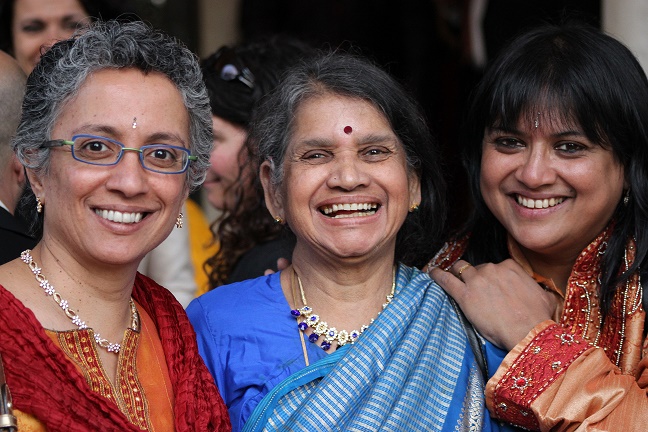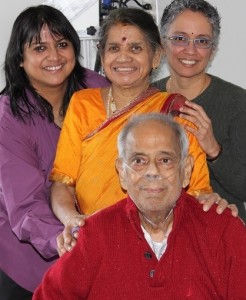As I get older, I find myself having more and more questions about how best to care for my aging parents, how my wife Mala and I can best plan for our retirement and beyond, and how we can best support and remain active in our LGBTQ people of color movements. I also see for the first time a critical mass of queer people of color (QPOC) who have been out for years or even decades, and are now at or near retirement age.
So I’m more excited than ever about the upcoming Creating Change conference in Chicago from January 20-24. We’ll have several opportunities for conversations with other QPOC elders who are grappling with these same questions and more.
Like many of our peers, Mala and I are caregiving for elderly family members: making sure they take their medicine, have healthy food to eat, exercise, get to their medical appointments, have clean clothes and functioning homes. We spend hours every week advocating for them with Medicare, their insurance companies, public transportation, and the legal system, while keeping an eye out for the next attempt by scammers to take advantage of them.

We’re also working to preserve their legacies: photographs, memories, stories, odd little artifacts of their lives. And there aren’t enough hours in the day for us to download all our moms’ recipes from their brain into our laptops, am I right? And over and over, I catch my breath at their resilience and wisdom.
Meanwhile, many of us are establishing new, grown-up connections with our parents, sometimes after decades of severed or severely compromised relations. How ironic it is that we, their queer children with crazily complicated family relationships in our younger days, are so often now the designated caregivers.
I wonder what will it be like to grow old as out, queer people of color. Where will we live? Who will take care of us when we’re no longer able to take care of ourselves? Having children certainly doesn’t guarantee caregiving, and many of us don’t even have children. We’re facing aging without a lot of safety nets; and the wealthy are pocketing what safety nets might have existed. While a few of us are financially secure, most of us will worry if we’ll have resources to meet our needs.
For those of us who don’t have descendants, or even legal heirs in the country, who will help us figure out what happens to our stuff? We may not have much, and it’s not necessarily money or real estate. It might be a family heirloom or jewelry. I have my violin. We’ll still want some say in where it all lands. Also, how about final decisions about pulling the plug, what to do with our remains, last rites? Have we had these conversations with the people who matter to us? Do we have wills and living wills and durable powers of attorney?
 I wonder if our service providers will be culturally competent. Watching my parents and Mala’s mom maneuver through the morass that is the U.S. eldercare system is sobering. Honestly, navigating the eldercare system sucks even for those of us who were brought up here in the U.S. with the advantage of native familiarity with the systems, language, and cultural nuances. It’s not easy, it’s a constant fight, it’s draining, but… and we’re native to it. The difficulty, the struggle, and the exhaustion are multiplied for immigrants. My father-in-law spent his last few days in a well-resourced nursing home in Potomac, Maryland, one of the richest places in the country, and even that facility was unprepared to adequately care for a well-off straight man who was Hindu and Indian-American and whose first language was not English. It’s hard to fathom how the home would tend to someone who was not affluent, cisgender, or straight.
I wonder if our service providers will be culturally competent. Watching my parents and Mala’s mom maneuver through the morass that is the U.S. eldercare system is sobering. Honestly, navigating the eldercare system sucks even for those of us who were brought up here in the U.S. with the advantage of native familiarity with the systems, language, and cultural nuances. It’s not easy, it’s a constant fight, it’s draining, but… and we’re native to it. The difficulty, the struggle, and the exhaustion are multiplied for immigrants. My father-in-law spent his last few days in a well-resourced nursing home in Potomac, Maryland, one of the richest places in the country, and even that facility was unprepared to adequately care for a well-off straight man who was Hindu and Indian-American and whose first language was not English. It’s hard to fathom how the home would tend to someone who was not affluent, cisgender, or straight.
So how do we build the cultural competency of our eldercare institutions? How can we expand services to be more accommodating of our diets, religious practices, languages – the list goes on – plus challenge racism, sexism, and homophobia?
I’m also curious about our social movements. Frankly, we could be doing a better job of building intergenerational spaces. So how will we pass on our institutional knowledge and our histories? How will our movements build on our experiences and minimize the need to recreate all the things? All that will only happen with intention, not by accident.
I wonder where conversations are happening about intentionally building a community together. How might we consider organizing together to support each other as we age? Are there models? How can we start now to prepare? Can we plan to move somewhere together and form a community, and if so, where, and who with?
I imagine that all of us over 50 are having these conversations in our own communities with our loved ones. What intrigues me is the sense of possibility that lies in us having this conversation in public with each other. What excites me is the idea of starting to create the architectural plan now, and building on it soon, while we have the brain space and energy and freedom to dream.
At Creating Change next week, we’ll be having these conversations. If we pool our collective wisdom, we will come up with solutions that surpass our imaginations.
Saturday, January 23: Rage Against the Dying of the Light: LGBT Aging Diverse Perspectives Aging and Ageism. We’ll talk about the unique needs of LGBT people of color as they get older, and the extent to which programs, services, policies, and laws are meeting those needs. Presenters: Ben de Guzman, Diverse Elders Coalition; Serena Worthington, SAGE-Services and Advocacy for GLBT Elders; Maria Glover-Wallace, Affinity Community Services; Vega Subramaniam, Vega Mala Consulting.
Saturday, January 23: Queer People of Color Elders Caucus. This caucus is a venue for us to start sharing our questions and struggles, and start planning together. Presenters: Vega Subramaniam, Vega Mala Consulting; Ben de Guzman, Diverse Elders Coalition; Maria Glover-Wallace, Affinity Community Services.
The opinions expressed in this article are those of the author and do not necessarily reflect those of the Diverse Elders Coalition.

